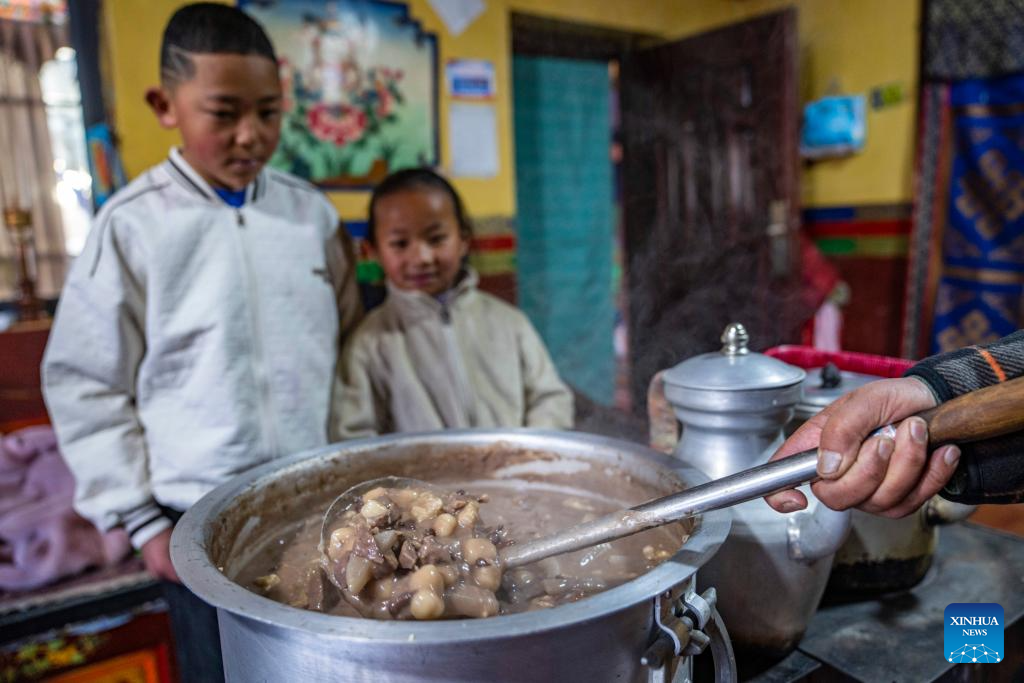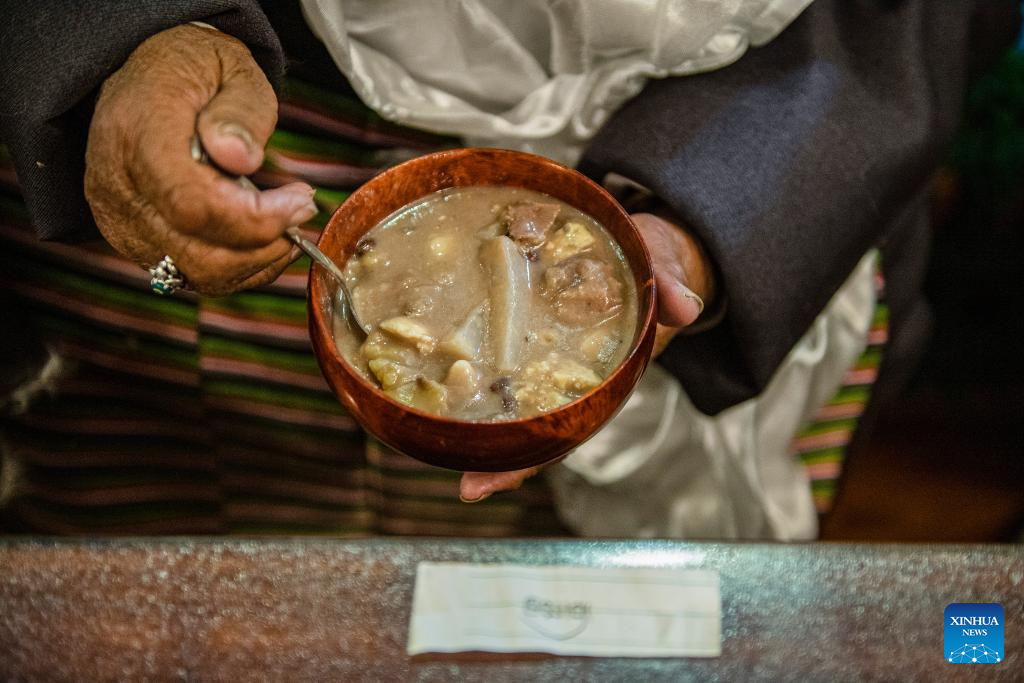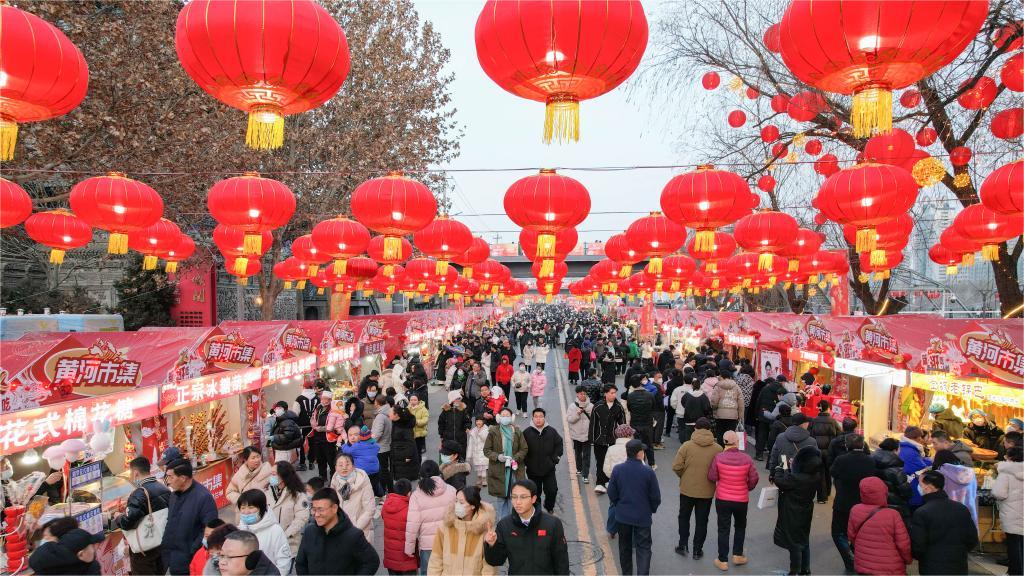Locals have feast of "gutu" to celebrate Tibetan New Year

Sichod Wangmo (R) takes a bowl of "gutu" from her son at home in Damxung County, southwest China's Xizang Autonomous Region, Feb. 8, 2024.
The Tibetan New Year coincides with the Chinese Lunar New Year, or the Spring Festival, which falls on Feb. 10 this year.
Two days ahead of the Tibetan New Year is the traditional "Gutu Eve" for families to have a feast of "gutu", a traditional soup dish made of flour, at home. "Gu" in Tibetan means nine, which is a lucky number. "Tu" means "pasta." Nine different fillings like wool, charcoal and chili are placed inside the dough drops, and each of these fillings has a meaning.
As the festival approaches, the village is exuding a cheerful and festive atmosphere. Like other locals, family members of Sichod Wangmo also gathered at home and enjoyed the feast, looking forward to having better days in the upcoming year. (Xinhua/Sun Fei)

Sichod Wangmo (2nd R) and her family have "gutu" at home in Damxung County, southwest China's Xizang Autonomous Region, Feb. 8, 2024.
The Tibetan New Year coincides with the Chinese Lunar New Year, or the Spring Festival, which falls on Feb. 10 this year.
Two days ahead of the Tibetan New Year is the traditional "Gutu Eve" for families to have a feast of "gutu", a traditional soup dish made of flour, at home. "Gu" in Tibetan means nine, which is a lucky number. "Tu" means "pasta." Nine different fillings like wool, charcoal and chili are placed inside the dough drops, and each of these fillings has a meaning.
As the festival approaches, the village is exuding a cheerful and festive atmosphere. Like other locals, family members of Sichod Wangmo also gathered at home and enjoyed the feast, looking forward to having better days in the upcoming year. (Xinhua/Sun Ruibo)

Sichod Wangmo's grandson Pasang Norbu (R) talks with her great-granddaughter Yangjen Lhamo after dinner at home in Damxung County, southwest China's Xizang Autonomous Region, Feb. 8, 2024.
The Tibetan New Year coincides with the Chinese Lunar New Year, or the Spring Festival, which falls on Feb. 10 this year.
Two days ahead of the Tibetan New Year is the traditional "Gutu Eve" for families to have a feast of "gutu", a traditional soup dish made of flour, at home. "Gu" in Tibetan means nine, which is a lucky number. "Tu" means "pasta." Nine different fillings like wool, charcoal and chili are placed inside the dough drops, and each of these fillings has a meaning.
As the festival approaches, the village is exuding a cheerful and festive atmosphere. Like other locals, family members of Sichod Wangmo also gathered at home and enjoyed the feast, looking forward to having better days in the upcoming year. (Xinhua/Sun Ruibo)

Sichod Wangmo's great-grandson and great-granddaughter wait to have "gutu" at home in Damxung County, southwest China's Xizang Autonomous Region, Feb. 8, 2024.
The Tibetan New Year coincides with the Chinese Lunar New Year, or the Spring Festival, which falls on Feb. 10 this year.
Two days ahead of the Tibetan New Year is the traditional "Gutu Eve" for families to have a feast of "gutu", a traditional soup dish made of flour, at home. "Gu" in Tibetan means nine, which is a lucky number. "Tu" means "pasta." Nine different fillings like wool, charcoal and chili are placed inside the dough drops, and each of these fillings has a meaning.
As the festival approaches, the village is exuding a cheerful and festive atmosphere. Like other locals, family members of Sichod Wangmo also gathered at home and enjoyed the feast, looking forward to having better days in the upcoming year. (Xinhua/Sun Fei)

Sichod Wangmo's daughter-in-law cooks "gutu" at home in Damxung County, southwest China's Xizang Autonomous Region, Feb. 8, 2024.
The Tibetan New Year coincides with the Chinese Lunar New Year, or the Spring Festival, which falls on Feb. 10 this year.
Two days ahead of the Tibetan New Year is the traditional "Gutu Eve" for families to have a feast of "gutu", a traditional soup dish made of flour, at home. "Gu" in Tibetan means nine, which is a lucky number. "Tu" means "pasta." Nine different fillings like wool, charcoal and chili are placed inside the dough drops, and each of these fillings has a meaning.
As the festival approaches, the village is exuding a cheerful and festive atmosphere. Like other locals, family members of Sichod Wangmo also gathered at home and enjoyed the feast, looking forward to having better days in the upcoming year. (Xinhua/Sun Fei)

Sichod Wangmo has "gutu" at home in Damxung County, southwest China's Xizang Autonomous Region, Feb. 8, 2024.
The Tibetan New Year coincides with the Chinese Lunar New Year, or the Spring Festival, which falls on Feb. 10 this year.
Two days ahead of the Tibetan New Year is the traditional "Gutu Eve" for families to have a feast of "gutu", a traditional soup dish made of flour, at home. "Gu" in Tibetan means nine, which is a lucky number. "Tu" means "pasta." Nine different fillings like wool, charcoal and chili are placed inside the dough drops, and each of these fillings has a meaning.
As the festival approaches, the village is exuding a cheerful and festive atmosphere. Like other locals, family members of Sichod Wangmo also gathered at home and enjoyed the feast, looking forward to having better days in the upcoming year. (Xinhua/Sun Ruibo)
Photos
Related Stories
Copyright © 2024 People's Daily Online. All Rights Reserved.









